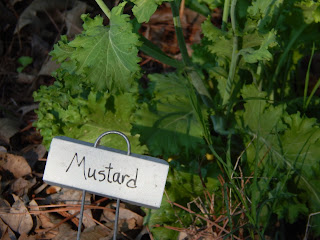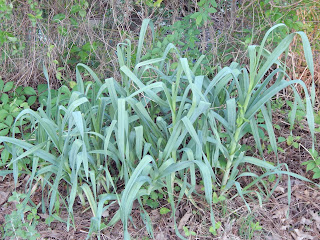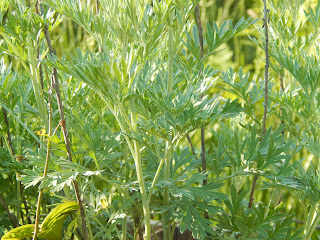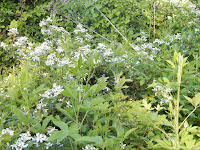The Complete Herbal Handbook for Farm and Stable by Juliette di Bairacli Levy is an amazing source of information if you want to learn how to treat most farm animal ailments naturally. I have spent much time reading and re-reading about many different herbs and plants, especially pertaining to worms. I would highly recommend this book if you are interested in herbal remedies for farm animals. As I read through this book, I began making lists of plants that are good for goats.
This little notebook contains the beginnings of my research, with ideas for several categories including: plants for feed, plants for overall health, plants for worms and plants to increase milk production.

Now as I head out in the morning to do the chores, not only do I take a bucket to pick slugs and weeds from the garden for the chickens, I take a bucket for some goat pickings as well. The amount and variety of things I pick has grown since I took this picture, but it gives you an idea. Here is a tour of my morning wanderings as I pick for the goats.

I usually start off with comfrey, with anywhere from three to five leaves per goat each day. I am having to limit how much I pick for now until the plants are really at full production. Because of that, the chickens don't get comfrey very often for now. Comfrey is a highly nutritious fodder plant for animals of all kinds.

Once the cabbage plants got big enough, I started picking leaves from the Michilli cabbage for the goats. It's a very good source of sulfur and other vitamins. It turns out cabbage is good for lice, as well. Each time I introduce something new, it may take the goats a day or two to get used to it, cabbage was one of those things, but now they really like it.
I have also started including a few mustard leaves in the last few days, which helps to expel worms. Some of the goats seem to really like them, but some of them don't. It's always interesting to see how they will react.
 Next to the mustard is the dandelion patch. I always try to have at least a handful of leaves for each animal. Dandelion leaves are good for overall health as well as expelling worms.
Next to the mustard is the dandelion patch. I always try to have at least a handful of leaves for each animal. Dandelion leaves are good for overall health as well as expelling worms.
I usually alternate between lemon balm and marjoram, which are both good for overall health. I want the plants to continue developing well for our own use, so the goats only get a few sprigs. They probably wouldn't eat much more than that anyway. It's part of the browsing nature of a goat.

Next comes garlic leaves which are high in sulfur and is an effective worm deterent. The goats won't eat much, but they will eat some. I have started to include just a little each day. Behind the garlic is a patch of honeysuckle.
I have a couple of healthy chive plants that I have started picking small handfuls from as well. They are also effective against worms.
 |
| Honeysuckle |
On Saturdays, I also pick a big handful of honeysuckle along with around four or five wormwood leaves for each goat. These two plants are especially good for expelling worms. One thing I have observed that I find to be very interesting is how the goats choose to consume them, or not. I have found that if I walk out into the barn with a large handful of honeysuckle vines, the does will gather around and heartily begin to strip the leaves from the vines. Until they are finished. Not until the leaves are gone, but until they are finished. My theory is, once a goat has eaten enough of a certain plant, they stop. Too much is not a good thing. And enough for one goat, may not be enough for another. They each stop eating the honeysuckle at their own timing. And the wormwood? Sometimes they will eat it and sometimes they won't. Last week I wormed One Stripe and Copper with the commercial wormers on a Monday. Saturday when I brought up the honeysuckle and wormwood, neither one of them would eat them, even though they always did on the preceding days I had brought them. As I wondered why, I realized that they didn't need the plants because I had just recently wormed them. Interesting, huh? Since tomorrow is Saturday, one week later, it will be interesting to see if they will eat these two plants tomorrow.

I started this wormwood from seed several years ago in this large wooden barrel. Now that I know it will continue to grow and have started using it, it's time to move it back into the fringes of the herb bed. Many other plants don't get along with wormwood too well, so it will be out on the edge of the bed next to the camphor wormwood I planted last year. It really does smell like camphor, and I haven't quite decided what I would like to make out of it. I don't use the camphor for the goats, though.

Since I recently read that blackberry leaves are good for goat feed, I stop at this patch of wild berries on the way to the barn and add a good handful of leaves to my bucket.
Last week when the vet came to disbud our youngest baby goats, we found out they had lice. As far as I know, we have never had a lice problem on our goats before. The vet said our extremely wet spring has created prime conditions for lice. I got out my Herbal Handbook again and looked up lice. It turns out that sulfur is a good natural remedy and you can add a teaspoon of sulfur to the goat feed. Well, that wouldn't work for the young babies that needed treating, so we put a little Sevin dust on them, and the teenage goats that are being weaned. But I needed a natural remedy for the does I am milking. It turns out garlic and cabbage contain sulfur. I was already feeding the cabbage leaves, so I increased the amount each doe was getting. That's when I added in the garlic leaves. They ate more of them the first day, but since then, they will only eat a limited amount. But so far, I haven't seen any lice on the does, so I hope this works.
So what do I do with all of these leaves? I dump my bucket on top of the big round bale of hay by the milk stand and sort everything out. I want to make sure each doe gets a portion of the harvest I have brought. And I only do this for the does I am milking, not the babies or the billy and wethers. As each doe comes to the milk stand, I give them their grain ration, then pile all of the leaves I have brought right on top of it. At first they seemed to be a little irritated with me, but now they just dig around the leaves, eat their grain, then usually have the leaves for desert. It's rather comical. But if I took all of these leaves out to the feeder and spread them out for the goats to eat, they would just turn up their noses and go graze in the pasture. I'm not sure why they will eat them from the stand, but not from the feeder. It's like it's a treat or something.
I am hoping that feeding the goats plants that we have growing here will eventually be enough to keep them healthy and somewhat worm free. I don't want to experiment to the detriment of their health, but I do want to try to eliminate the commercial wormers. I know there are companies that sell a natural wormer, but if I am going to change over to natural, I would like to see if growing our own plants will work. Only time will tell. It may take a year or more to really see what the outcome will be. I'll let you know.
For the off season when the plants aren't growing, I plan to dry the herbs. But, with nature, worms generally aren't a problem in the winter months since the worms go dormant, some in the ground, some in the goat. There are other techniques for controlling worms, pasture rotation, short or tall grass and others.
This brings us to another question. If the time comes when we are dependent upon ourselves, and we get worms, will these remedies work on us as well? Many of these plants are a common part of our diet and I have read that wormwood can be used with humans. But that is a whole different research project. Just food, pun intended, for thought.
Until next time - Fern


















This is an interesting topic. I have found that with adequate pasture, and no over crowding I don't have to deworm but once a year, after kidding. Of course that was up in IL and things have been different down here, as evidenced by my recent bout with barber pole. I'm curious to see, now that we've made it over that hump, if I can go back to only deworming once a year, since my girls have such a large pasture and such varied browse. Fingers crossed! Like you though, I won't got totally au-natch-er-al if it compromises the health of my girls.
ReplyDeleteI agree, Goodwife. We have found that our pasture rotation routine greatly reduces worm infestation. Plus we have enough grazing room for many more goats, but we have just enough. Thank you for sharing.
DeleteFern
Years ago an old cowboy told me that they gave a little tobacco to their critters to dispel worms. Old time remedy...I think that the tobacco was different then, too.
ReplyDeleteNow that you mention it, Tewshooz, I think I have heard that before also. But I don't keep in tobacco on hand. Thank you for sharing.
DeleteFern
Really enjoying your goat series, such useful info. I have a lot of comfrey planted for ourselves and our chickens... glad to know it's good for the goats as well. Very interested in growing food for goats too. Thanks for the herbal book reference, will certainly track that down.
ReplyDeleteYou're welcome, Mindy. You will enjoy the book, it is full of information. I feed the comfrey to the chickens and goats, but we have not eaten any. Some sources advise against human consumption, while others suggest eating it or making tea from it in moderation. Thank you for your comment.
DeleteFern
Hi,
ReplyDeleteI was wondering if you would ever consider administering turpentine to your goats to expel worms? Once or twice a year my grandfather gave all his animals turpentine as a health tonic. He used to give it to his kids too-- like three drops on a teaspoon of sugar.
Anyway, it's an old timey remedy-- and I figured I'd put it out there for you to look into. There's a lot of interesting information on the internet about using turpentine (gum spirits). There is even this doctor that talks about a protocol for using... Jennifer Daniels, I believe.
Sincerely,
Kristy
P.S. (I am not suggesting you kill your animals, just mentioning a perspective that might be worth researching).
I have read about turpentine several times, Kristy, but am not comfortable with using it. I'm also trying to learn about using things that I can grow or produce without having to buy something or depend on other sources. Thank you for sharing this information. There may be others that are unaware of it.
DeleteFern
Wormwood-use as perennial border to keep small animals away. Deters flea beetles. ~Sassafras
ReplyDeleteThank you, Sassafras, I have read that, too. So far the only thing I am using it for is to worm the goats.
DeleteFern